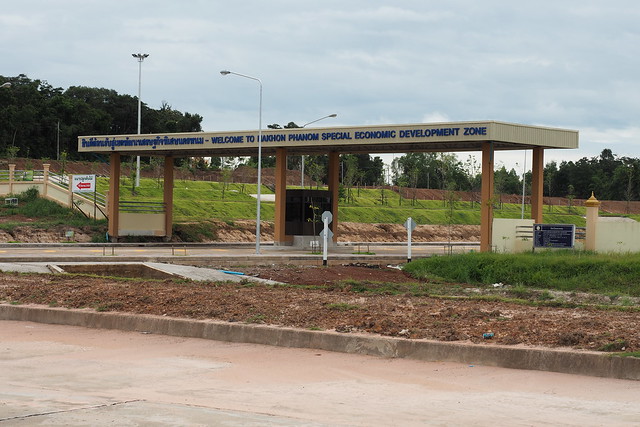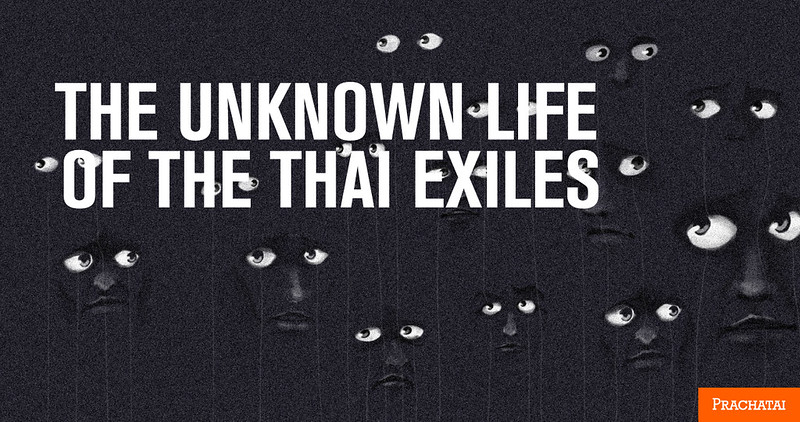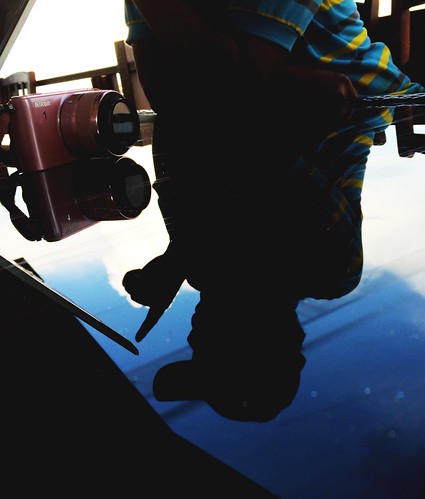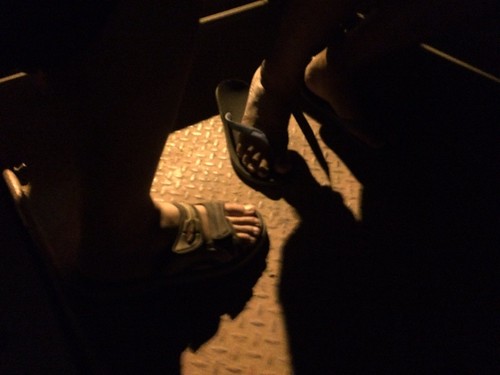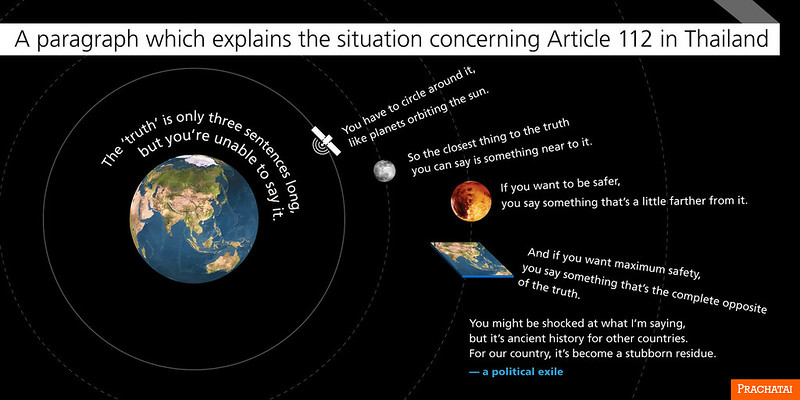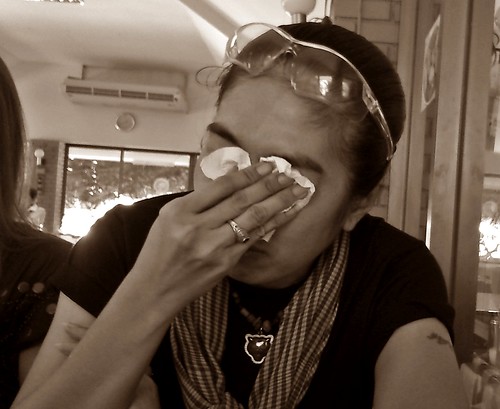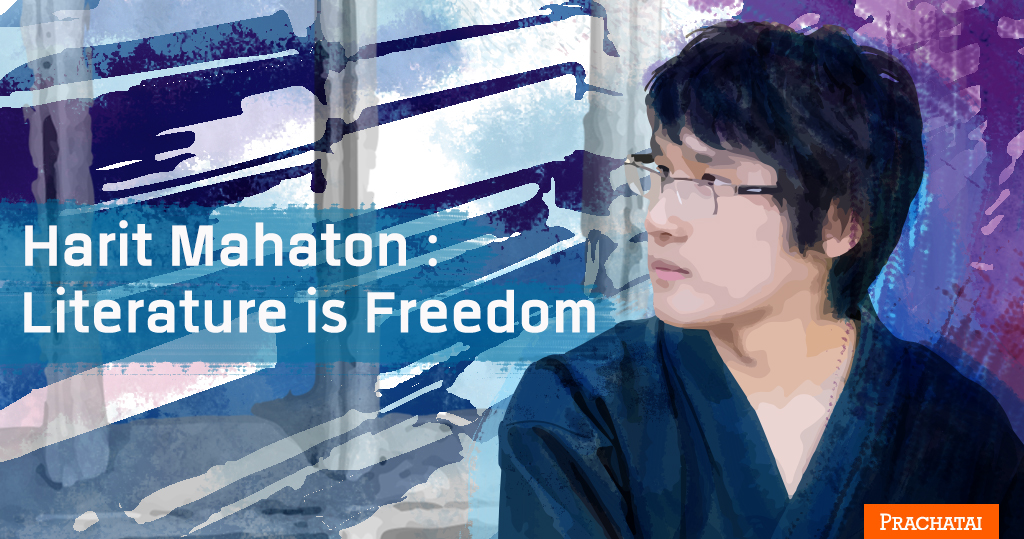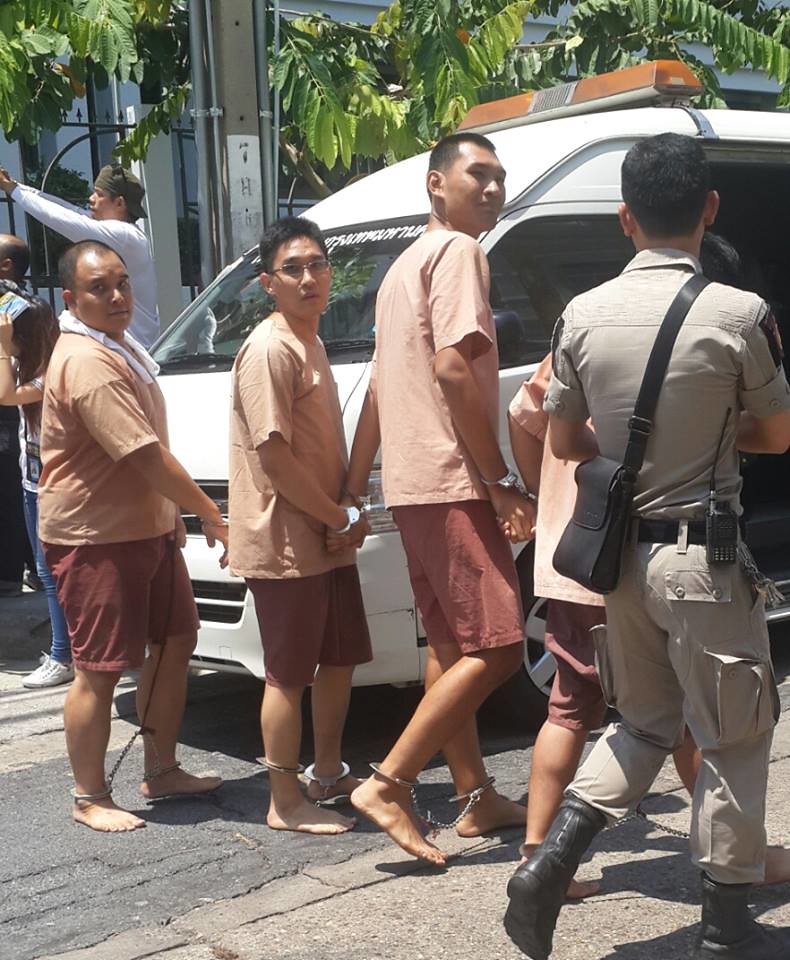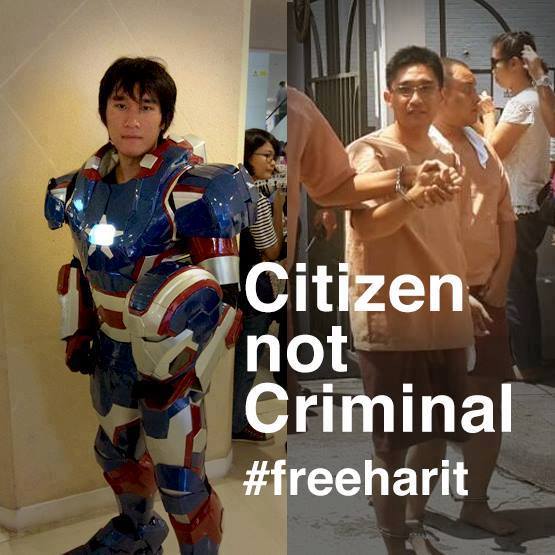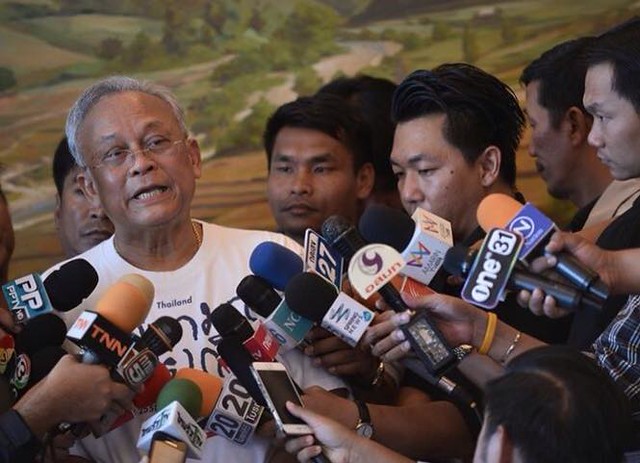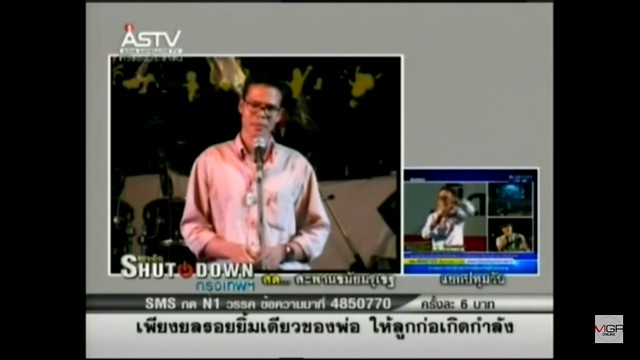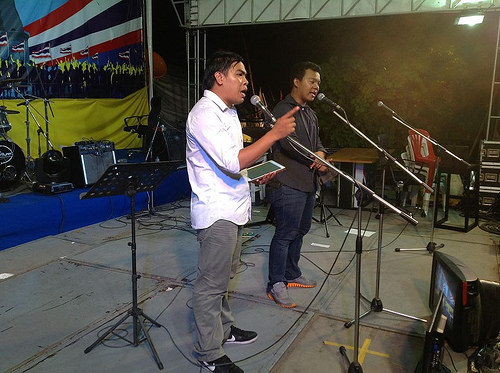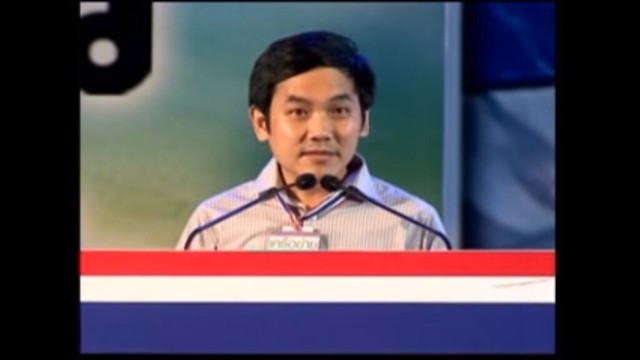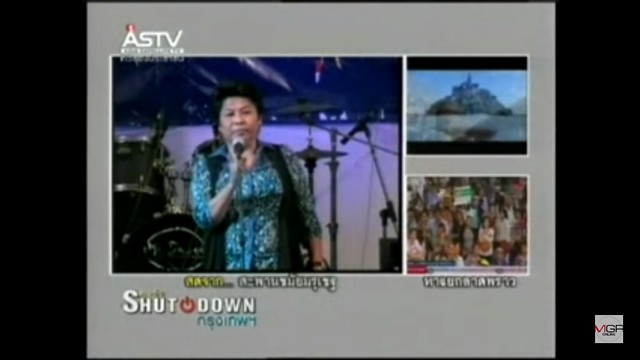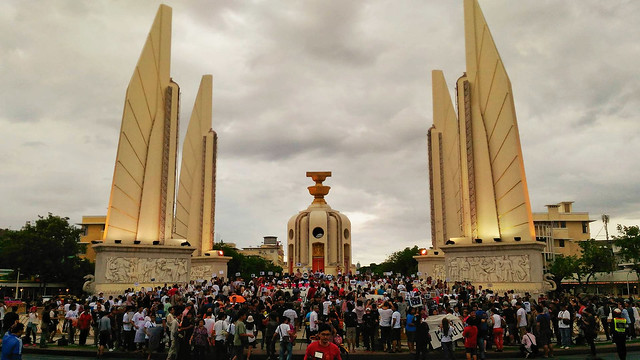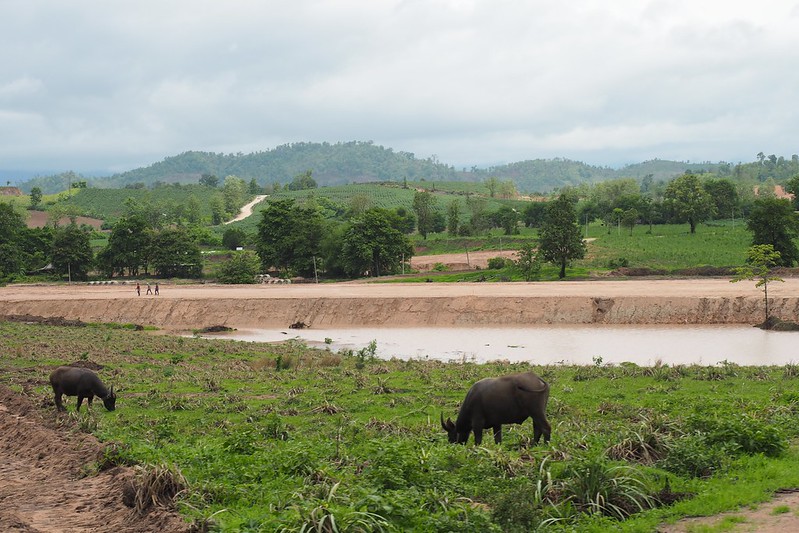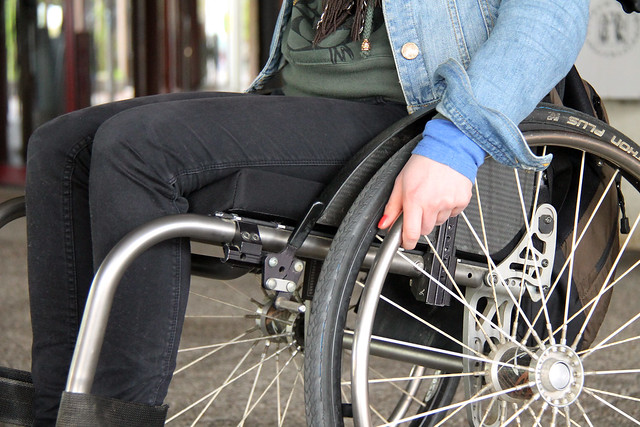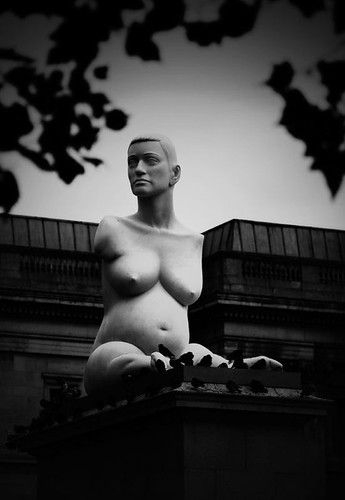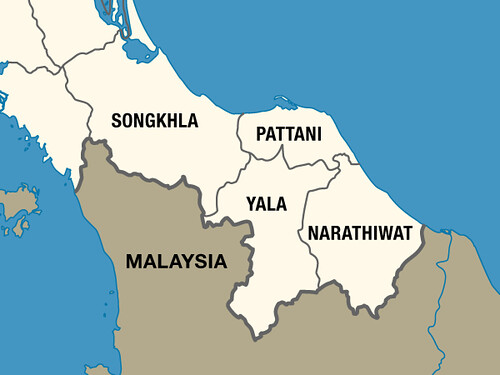Thailand’s assimilation policy in the past 80 years on the Muslim Malay in Thailand’s three southern border provinces, known as Patani, has been repeatedly cited as one of the main reasons for the armed struggle, claiming almost 6500 lives already. Due to this uncompromising assimilation policy, the state of the Malay language in Patani has become very weak and marginalized. As the peace process has progressed, concerns about the linguistic rights of the local people have been raised and will be included in discussions at the dialogue table.
On the sign of Krue Se Mosque, the first line in Arabic says ‘The Mosque of Sultan Mustafa Shah’. The second line in Jawi Malay says ‘The Krue Se Victory Gate’. The third line in Arabic says ‘Fatoni Darussalam, Anno Hegirae 877’.
Five years ago, Muhammad Dueramae started a bimonthly publication called Sinaran. It is the first newspaper of its kind written in the Malay language using Jawi script. The content features social events and movements, as well as stories of personalities of interest and civil society workers residing in the three provinces of the Deep South, also known as the region of “Patani”. To protect the publication and those associated from government inspection, Muhammad has incorporated a Thai-language introduction on Sinaran’s cover page: “It is not possible to use 100 per cent Jawi in this publication. Doing so would put us in a much more vulnerable position, risking scrutiny from the authorities concerning the content of our material. It has been observed that the Thai majority tend to be unwelcoming towards diversity. Thus, a Thai-language introduction on the front cover may help to reduce risk of discriminatory probing.”
![]()
The bottom of Sinaran’s front page features Thai-language headlines, specifically to reduce scrutiny from those who cannot read the Jawi text.
Part of the Sinaran’s target readership is the Movement for Patani Independence, including those readers living abroad who do not read Thai. “To communicate with members of the movement, we have to take into account that some of the members do not read Thai. But they do read Malay. We do our best to present information about those working on the ground. This form of communication will help reduce the tendency to use weapons, so that people may instead find more peaceful means,” Muhammad tells Prachatai. He added there is not enough communication on the situation from Patanians to the Malay community who live in Malaysia and Indonesia because there were no Malay-language news resources available. As a consequence, they did not have a thorough understanding. They then have to rely on the Bangkok-centric English-language media.
Muhammad Dueramae, editor of Sinaran and the Deep South Journalism School
As the Jawi script is not commonly used, it is becoming increasingly rare for young people to be equipped with Jawi reading and writing skills. For this reason, Muhammad organises classes in Malay language reporting with a focus on Jawi. His target students are those at the pondok schools — traditional Malay-Muslim schools offering Islamic studies, including Malay and Arabic studies. Among the first groups of pondok students trained by Muhammad is one in particular which was suspected of involvement in an incident of unrest. “One interpretation is that those who are proud of their identity must also be involved with those who want merdeka (independence)”, Muhammad tells Prachatai. He also envisions a website called Sinaran News Online, publishing information about the three provinces in the Jawi and Rumi scripts, and also in Thai and English, while focusing on Malay as the primary language of delivery.
Extending the Life of Jawi script
Jawi script keyboard layout, developed by Solahuddean Kariya.
Solahuddean Gariya, also known as Solar Garia, is another cultural conservationist and developer of the Jawi script keyboard. As a leader of the Awan Book Group, he has developed a Jawi keyboard that has been especially adapted to the Patani style. In the digital age, it is more important than ever before to elevate the electronic status of Jawi. Upon completion of the keyboard development project, he plans to make this product public property. Solahuddean further envisions that it as a direct way of solving the problem of updating Jawi into a form of communication aligned with technological advances: “If we don’t keep updating Jawi to catch up with changing technology, fewer and fewer people will use it due to its limited applicability. And the language and the script will just die out. We must extend the life of Jawi, so that it becomes a practical linguistic option that stands on an level equal to other languages for the people of Patani.”
Solahuddean tells Prachatai that the more common practice today is to use the Arabic keyboard to type the Jawi script. The main disadvantage, however, is that the Arabic keyboard layout does not offer the additional five characters used in Jawi. So as far as typing in Malay is concerned, the Arabic keyboard is incomplete, leading to inaccurate typing. The Awan Book Group has designed a new Jawi keyboard, which is very different from the Malaysian Jawi keyboard layout developed in 2012. The latter is arranged according to the QWERTY keyboard layout displaying the Latin script. The people of Patani are not familiar with QWERTY, as they are far more familiar with the Arabic version. The existing Jawi font was developed decades ago, and has not been adapted to the Unicode system (which is the system that allows fonts to be used in all computer operating systems). This handicap has prevented application in general computer software and print media. With the Jawi script being so technologically underdeveloped, it lacks the capacity to respond to social demands. For this reason, people turned to languages that are far more socially responsive, such as Thai.
![]()
Solahuddean designs an unfamiliar style of Jawi script
The Awan Book Group plans to establish an academy of Malay studies for the three southernmost provinces. This academy is to become the Patani people’s equivalent of the Office of the Royal Society, which is the royal academy of Thai language studies. As a regional academy, its role will be to set appropriate standards of linguistic accuracy and applicability. There will be a Malay language clinic whose purpose is to elevate Malay into a status equal to Thai, and to ensure that government policies truly reflect the needs of the Patani people. As another avenue towards expanding the Jawi presence, Solahuddean has also set up the website www.
jawipatani.com which presents information concerning politics and society in the Jawi script.
Malay: A Dying Language
Today, it is common for the Malay people of the three provinces of the Deep South to use Thai as their dominant language. This is especially so for the younger generation living in the cities who can use Thai just as well as the rest of the country’s population. With this widespread use of Thai among the Southern youth, their reduced use of the Malay language and Jawi script also means reduced quality in application. Hara Shintaro, a Malay language specialist, compares the Malay language situation in the Patani region to being in a state of ‘ICU’, meaning in a rapidly weakening, dying state.
“The very bitter but crucial fact is that Malay in Patani is so weak,” Hara tells us, adding that the number of speakers is declining, especially in the towns, and the lexicon is also diminishing, replaced by so many Thai loanwords that almost all conversations between Patani Malays are incomprehensible to Malaysians or Indonesians. The number of those who are not able to write or read in Malay is increasing remarkably, and the use of Thai script for Patani Malay is clearly observable in social media.
“With regard to quality, I would explain that hardly any native speaker of Patani Malay can conduct a conversation for a long time without being influenced by Thai, either in the form of a loan word or phrase, code-switching or even language shift.”
Results of a Peace Survey to discern public opinion on the Peace Process. Survey 1 shows that the people of the three southernmost provinces are most comfortable using their native Malay language within their family environment. (See all slides)
Peace Survey 1 was published on 17 May 2016. The survey was conducted with representative groups of people residing in the three southernmost provinces, amounting to 1600 respondents in total. It turns out that within the family environment, 55.9 per cent use local Malay, 16.5 per cent use the Southern dialect, 16.2 per cent use a combination of Malay and Thai, 5.5 per cent use a combination of central and southern Thai, and 2.6 per cent use central Thai. However, when it comes to speaking, listening, and writing, Thai remains the language used with the most skill and convenience. Second from Thai are Jawi Malay and Rumi Malay. When it comes to writing, 75.9 per cent use central Thai, 39.5 per cent say that they can write Jawi Malay, 25.8 per cent can write Rumi Malay, and 8.2 per cent can write Arabic.
Jawi (or what is often mistaken as the “Jawi language”) is actually a script. The characters are Arabic, with an addition of five characters (in Malaysia, they have a sixth additional character) representing certain sounds that Arabic does not have. Malay is also written in the “Rumi” script based on Roman (Latin) letters, officially used in Malaysia, Indonesia, and Brunei.
Jawi characters; image courtesy of Wikipedia.
When was Jawi first invented? Linguistic specialists have yet to provide a definite answer. One may make a general assumption that Jawi was developed around the 16th century, during the spread of Islam throughout the Malay Peninsula. Jawi was commonly used in the peninsula, until the English and the Dutch came to colonise the land mass that constitutes present-day Malaysia and Indonesia. The colonisers brought with them the Romanised (Latin) script, and from that emerged the Rumi script that came to replace Jawi. “While the English and the Dutch adapted Malay to suit the running of their empire, Siam conducted no development of the sort. They tried to swallow our language, and even made a success of it in Satun Province. The people of Patani are intent upon preserving our culture, but under suppression, it is difficult for our language to flourish. We the people can only resist. Now, our language is in ICU, but still not completely dead. If we make progress in properly targeted problem-solving, we may be able to develop our language to the level that we see in Malaysia and Indonesia,” Solahuddean tells us.
![]()
The sign of Petaling Street in Chinatown of Kuala Lumpur, Malaysia; the sign is written in Rumi Malay, Chinese, and English.
Today, Jawi is taught only in Tadika schools (religious schools teaching out of official school hours), pondok schools (traditional schools teaching Islamic), and religious class in private Islamic schools. It is also taught in religious classes of private Islamic schools. However, the education policy of the Thai state which aims to assimilate Malays as ‘Thai’, especially in education, has reduced the use of the Malay language by the Malays in the three southernmost province and lowered its quality, especially in reading and writing in the Jawi script.
“Up until the 1990s, Malay pupils were forbidden to speak Malay in schools. Speaking their own language might lead to punishment, either physical or financial (such as a 1 baht fine for each Malay word). This is the reason why at the initial stage of the conflict a lot of schools were set on fire and burnt down,” Hara writes in an article titled
An Extraordinary Event of Ordinary People.
‘Rumi’ versus ‘Jawi’: An Unending Debate
Zakariya Amataya, a Malay poet from Narathiwat and recipient of the 2010 Southeast Asian Writers Award, describes the Malay of the three southernmost provinces as a ‘frozen language’, as it is a language that is hardly experiencing any movement. Writing in Jawi Malay is not at all common, and limited to religious scholars. There are media in Jawi created by language conservationists, but even these are not widely distributed. “We need to be very worried about Jawi, as those who claim to read it can hardly do so. Thai has dominated the communication landscape in the three provinces. People here read and write Thai much better than Jawi, and this is especially the case among the educated class,” Zakariya tells Prachatai. “Here in the three provinces,” he adds, “how then would I say or write, for instance, the word ‘engineering’ in Jawi? It’s like the language has fallen into a trap. In Malaysia and Indonesia, they have upgraded their language very fast. But here in the three provinces, the language is hobbling.”
![]()
Zakariya Amataya
Zakariya tell us that most Jawi texts are scriptures and other religious documents, mainly used in the pondok schools. These texts are centuries-old. For this reason, it is hard to find vocabulary that may apply to today’s lifestyle. There have been efforts to revive Jawi through publications, but these projects have proven inadequate. “Language must evolve along with all the associated components: magazines, newspapers, fine literature, and regular content. So far, Jawi has not significantly accomplished any stage of this evolution. I am not blaming anyone here, but this is the way things are. Part of the problem is that we are under the control of the Thai state that has never done anything to support Malay.”
Zakariya suggests that it is Rumi, rather than Jawi, that should be promoted in Patani, so that it is similar to the neighbouring countries. “Using Rumi would then put us on the same level as Malaysia and Indonesia, allowing us to use the language and resources already developed by them. We can use their readily available Rumi texts, branching from their paths that have long been paved. But if we choose instead to develop Jawi, that means having to start from near zero. We have to accept that Jawi has only been used in narrow circles, unfortunately constituting a small part of the Malay world. So when communicating with others from foreign places, we still have to shift to Rumi. It is best to choose either one or the other. Learning and studying both at the same time would dilute the effect, in turn weakening both,” the S.E.A Write Award winner tells us. “For progress in language and the world of knowledge,” he adds, “we should choose Rumi. If children learn Rumi from their early years, following high school, they can then go on to a university in Malaysia. There will be no need to attend adaptation courses to familiarise themselves with Rumi. I’m trying to be realistic here.”
Nevertheless, while keeping this vision of promoting Malay in mind, Zakariya adds that, as a writer himself, he would still advise the Malay youth to practice writing literature and poetry in Thai, as it is Thai that will give them a future platform in the world of Thai publications. “If you write in Jawi, you will almost have no platform from which to establish yourself. You can still write in Rumi, if you can write well enough. Then, you will have a platform in Malaysia.”
However, most members of Patani civil society seem to favour the preservation of Jawi.
Najib Arwaebuesa, an expert in Patani Malay culture, says that he is especially worried about Jawi, as this is the script that plays the most significant role in reading and understanding old texts. These resources document the folk wisdom of ancestors of the Malay. The texts represent literary heritage of great richness of. If Jawi is to disappear, a large portion of folk wisdom will disappear with it. Furthermore, Jawi is more harmoniously aligned with certain sounds in Malay, and in this regard, serves as a better option than Rumi.
Hara is of a very different opinion from Zakariya, arguing that promoting Jawi is more realistic than Rumi. He reasons that the implementation of a new or foreign writing system such as Roman script, or a concocted Thai-based writing system is not as practical as the promotion of Jawi script, which can at least still be read by the majority of local people. “When we already have a practical writing system, what is the use of introducing something else?” And this is where Solahuddean agrees with Hara: “Jawi is a symbol of cultural identity, holding an important place in the hearts of our people.”
Colonised Language
Hara points out that Malay has suffered enormously under colonial rule. He cites the case of Malaysia: “During the colonial era, Malay was deprived of the opportunities to develop according to the passage of time, to the extent that a prominent Malay linguist (who happens to be the supervisor for my master’s degree) described Malay before the independence of Malaysia as ‘the language of coffee shops and markets, with no place given to it either in officialdom or in the higher educational institutions’”
Hara proposes that the Thai government assign official status to the Malay language, especially to ensure that the government will be held accountable for the development of all facets of Malay, as is the case for Malaysia and Indonesia. “The legal status of a language is crucially important for its development. Therefore, this at least is a positive aspect. However, legal status doesn’t always guarantee full use of the language.” In Malaysia, Malay has a strong legal position as a national language, and also reigns as the country’s only official language. But in practical reality, it is English that is the most important language in professional and social circles. This is where English, in fact, holds a higher status than Malay. “In a sense, Malaysia is, spiritually speaking, not an independent country; the mentality of the people is still colonized.”
Here is the difference between Malay in Malaysia and Indonesian. The former has the strong legal status as a national language and the sole official language of the country (Malaysia). However, as everyone knows, in many aspects, especially in the media, economics, higher education, legal affairs and so on, English is far more dominant than Malay. Proficiency in English is far more advantageous than in Malay, and those who have are weak in English can easily be at a disadvantage, for instance in finding jobs and social promotion.
Thai State Suppression of Malay: The Core of Conflict
It was for their language that the Patani Malay put up a fight using weapons. The political ‘knot’ was tied very tightly 80 years ago, when Prime Minister Marshal Por Phibunsongkhram enforced his Thai Cultural Mandates, forcing all citizens to learn and speak Thai. It was forbidden to identify people by their ethnicity. Instead, they had to be called ‘Thai’. They were even forced to dress the same, in accordance with rules and regulations imposed by the government. These Mandates were an attempt to attain the level of the so-called ‘civilised nations’ when the country became involved in the World War II.
A poster displaying dress codes which follow the Thai Cultural Mandates, forbidding the wearing of the traditional sarong and even Malay-style hats.
Such policies inflicted extreme and ongoing damage to the Malay culture of the Deep South, as Malay was the language used in everyday life, at school, and especially in religious studies. It is no surprise that the collective anger accumulated into an explosive rage.
Almost 60 years ago, there was a ban on an important Malay book titled Sejarah Kerajaan Melayu Patani (History of the Malay Kingdom of Patani), written by Ibrahim Shukri, published in 1960. Copies were destroyed. It was
described as “the first nationalist history that established a model for a master narrative of Patani history for the future”. In other words, it was the ‘painful’ history of what the Thai state had done to the Malay.
Although the book was banned by the Thai government and even the Malaysian government for allegedly instigating rebellion, this imposed taboo further inspired the curiosity of the people of Patani. Pol Maj Gen Chamroon Den-udom, now retired and an expert in Patani history, tells us that it was a social phenomenon that created a climate of fear overshadowing the Jawi script.
“In the old days, just being in possession of books in Jawi script may have been suspicious, the suspicion that it was a work of incitement, because Thai police did not understand or read Jawi. If they just found Jawi writing, they would try to force charges like opposing the policies of Field Marshal Por or incitement. Those in possession of Jawi books had to hide them. They buried them in earthen jars, under the ground, hid them in sheds, or even burned them. Teachers in the pondok schools, who taught in Malay, were threatened. Many residents escaped to Kelantan,” Chamroon tells us, adding that the attempts to suppress the Malay language and the pressure on the pondok schools were connected: “It made the Malay people perceive that the Thai state was trying to interfere with their religious practices. The government in turn perceived that the Malay would use the Malay language and the pondok to instigate the masses.”
Thanet Aphornsuwan, a Patani historian at Thammasat University, offers the interpretation that Jawi has always been a source of pride for the Patani Malay, and for significant, deep-rooted reasons. It was through Jawi communication that their religion reached intellectual and creative heights, and the Patani region became an important port destination for trade and exchange. Religious texts written by the ulama Jawi, Patani philosophers of religion, were studied all over the region. Malay was also the language of trade in Southeast Asia: “During the Ayutthaya Dynasty, Malay was the language used in trade and exchange with the royal court. Even the Ayutthaya court had to have its own Malay speakers. So we can see that Malay was already a language of significant status going back to the Ayutthaya era, while Thai was not actually used in trade and exchange at all. Malay is used throughout the Malay Peninsula. We may even think of Malay as a regional language.”
Professor Duncan McCargo, of the School of Politics and International Studies at the University of Leeds, explains in his book Tearing Apart the Land: Islam and Legitimacy in Southern Thailand, that the pondok schools are the main obstacles preventing the Thai nation-state from assimilating the Malay with any measure of success. Pondok schools constitute the foundation of Malay language and Islamic studies. Since the 1960s, the Thai government has attempted to impose rules and regulations to control pondok schools. When violence broke out 12 years ago, pondok schools were targeted as the places of assembly for separatist planning and jihad thought. The Thai government then set out to turn the pondok into ‘Thai’ schools, by convincing pondok owners to change them into private schools, teaching Islamic studies only alongside a mainstream curriculum that is taught in Thai.
The Vanished Proposal of Haji Sulong
In 1947, Haji Sulong Abdul Qadir Tuan Minal (Tohmeena), an imam who was the leader of the Provincial Islamic Council of Patani (PICP), formulated a seven-point declaration to the Thai government. Points 3 and 4 were demands to protect Malay:
3.) that Malay and Thai be used together as the languages of government.
4.) that for the first seven years of the school curriculum, Malay be allowed as the language of instruction.
Haji Sulong Abdul Qadir Tuan Minal (Tohmeena), a Patani icon of political and social struggle.
Because of the seven-point declaration demanding rights for the Malay, Haji Sulong became a rebel targeted by the Thai government. He was imprisoned. In 1954, he was killed, his corpse hidden and destroyed. No government officials were held accountable. What happened to Haji Sulong pushed some groups of Malays to fight back using weapons. “Haji Sulong did not belong to a separatist group. He only wanted rights in language, religious expression, and various needs according to the local context. The lesson of the enforced disappearance of Haji Sulong after he made his seven demands to the Thai authorities led one part of the movement to conclude that when peaceful means do not succeed, and even result in more oppression from state officials, armed struggle will be used,” Abu Hafez Al-Hakim, a member of the MARA Patani Dialogue Panel, told Prachatai.
When violence broke out in 2004, the Thai government began to open up towards linguistic and cultural diversity. According to the National Reconciliation Commission, set up during the Thaksin Shinawatra government, two conditions still fuel violence in the three southernmost provinces. One is directly related to the Malay language: “Cultural conditions, meaning uniqueness of religious expression and ethnic identity, in this instance, refer to the Islamic religion, the Malay language, and Patani history. These are the conditions that have served as justification for incidents of violence, and even caused many to accept and be in agreement with those performing violent acts. It is to uphold their identity as Malay-Muslims that the people of the three southernmost provinces were pushed to behave in the way that they did.” Furthermore, there was a clear proposal “to make Malay another official working language in the Deep South”.
To Tie or Untie the Knot?
The sign of the Southern Border Provinces Administrative Centre, in Thai, English, Jawi Malay, and Chinese. Photo courtesy of the Department of Public Relations.
From 2011-4, when Police General Tawee Sodsong was Secretary-General of the Southern Border Provinces Administrative Centre, there were avenues opening towards Malay linguistic and cultural diversity. There was a Malay television channel airing 24 hours a day, and even 24-hour Malay radio on 95.0, organised by Radio Thailand in Yala Province. An Institute of Malay Language and Literature in Thailand (Dewan Bahasa dan Pustaka Melayu Thailand) took up the cause of including Jawi script in official signs. However, following the coup, the Malay TV channel was cancelled. There has been no progress since television was transferred under the control of the Prime Minister’s Office.
A Bilingual Project (Thai and local Malay) established in 2012 by the Research Institute for Languages and Cultures of Asia, Mahidol University, targets children from the first year of kindergarten to the 6th year of primary school, who speak Malay as their mother tongue. The key is to teach in Malay with links to Thai, and the most important tool is a system of writing Malay using Thai letters. At the kindergarten level, children will learn to write and spell Malay using Thai consonants and vowels, which means adding eight sounds, such as ‘g’, ‘y’, and ‘r’. When they have mastered writing and spelling using Thai letters, they then begin to learn Thai, and study other subjects in Thai in order. The project claims that this teaching method makes Malay children happy to learn and improves their performance.
![]()
Suwilai Premsrirat, a researcher on this project, says that the project arose from a recommendation of the National Reconciliation Commission, which proposed to the government a system of education appropriate for local languages and cultures. The project will “maintain the identity of Thai people of Malay descent amidst the current social changes according to the wishes of the native speakers, and will help children to study happily.”
In certain aspects, the Bilingual Project may indeed have a positive effect upon children’s capacity to learn Thai. However, it is inevitable that there are opinions coming in from many directions that the project is in fact another way of making Malays abandon the Jawi script.
Solahuddean says that he strongly disagrees with the Bilingual Project, because it is intended to destroy Jawi script and swallow it to become Thai. It is not what the people need. As for the Institute of Malay Language and Literature in Thailand, it has no results to show the language has been promoted. “It is getting Malay language experts under the control of the Southern Border Provinces Administrative Centre. It’s for show for our neighbours and foreign guests. It’s just a shell. But it has never tackled the core of the problems with our language.”
Hara tells us that the Bilngual Project has created widespread dissatisfaction among people in the area, because they see it as a severe insult to the local language that has been used for over a century. “I think this project has a damaging effect upon our peace-making efforts,” Hara says and adds, “This is another form of cultural colonisation. It has never solved any problems, but is causes new problems.” He insists that when Tawee Sodsong was the Secretary-General of SBAPC there were many important changes about the Malay language, but they were rather superficial and insincere, such as the Institute of Malay language in Thailand which people have compared to the Malaysian Institute of Language and Literature, but which has no legal status, unlike Malaysia. As for the Jawi scripts on official signs, that mostly applies to the signs outside. Inside the buildings, there are almost no signs in Jawi.
Hara suggests that the Thai state should give the Malay language legal status, such as by a constitutional guarantee of the status of minority languages or legal status for the Malay language institute, and draft a plan for state-supported learning and development of the Malay language. He says this is one way that Malay in Malaysia and Indonesia regained its strong status after independence.
MARA Patani Demands a Stop to Assimilation
MARA Patani leader Abu Hafez Al-Hakim told Prachatai that the Malay language issue is one that MARA Patani will bring up for discussion in official peace talks with the Thai government.
“If Patani gets the right to become an autonomous region, we will use Thai and Malay. If we get independence, then it will be Malay and Arabic. But in both cases, English will be our international language," Abu Hafez Al-Hakim
Abu Hafez Al-Hakim
He believes that the cause of the decline of Malay in Patani is Thai state’s assimilation policies which obstruct education in and the use of Malay at an official level. The media have also had a role. “After Siam used an assimilation policy of ‘Thai nationalism’, Malay was systematically forced into a decline and lost its importance,” Abu Hafez said, adding that, this problem is not difficult to solve, just by turning state policy around. He also speaks of Haji Sulong who had foreseen this problem. “When Haji Sulong made the seven-point declaration sixty years ago, which include Malay language issues, he must have already expected that if the problem was not solved, the fate of Malay would be hopeless. We have seen that this is the truth today.”
When asked for his opinion on the Thai government’s efforts over the past decade, Abu Hafez said that some attempts to restore Malay have been quite admirable. However, such efforts were put into practice, not because the Thai government sympathised with the Patani people because the Thai government prioritised economic and political relations with ASEAN.
When asked how he, as a member of a movement for Patani independence, sees the future of language in Patani, he said that if Patani becomes independent or autonomous, he sees the Patani people speaking up to four languages:
"Malay, as a language of the Patani majority;
Arabic, as it is the duty of Muslims to know Arabic;
Thai, as a language of the Patani minority;
English, as an international language.
But Thai Buddhists do not have to know Arabic."
Abu Hafez said that he sees Malay children learning both Rumi and Jawi, because both are valuable and important, and from his own experience, knowledge of Jawi helps speed up the learning of Arabic, and the same with Rumi and English.
When asked, as one member of the movement, how he envisions official languages and working languages if Patani becomes independent or autonomous, he said “If Patani gets the right to become an autonomous region, we will use Thai and Malay. If we get independence, then it will be Malay and Arabic. But in both cases, English will be our international language.”
The story was frist published in Thai and translated into English by Lalipa Nilubol






